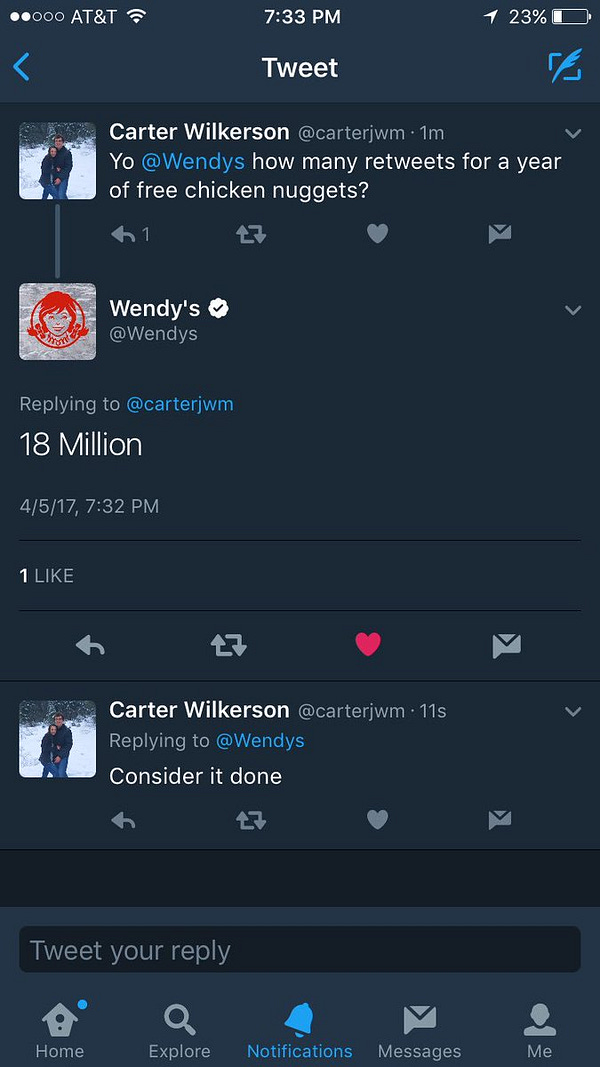
Last week saw much of the world declare the end of Twitter after its acquisition by Elon Musk. It was as if he’d shot Twitter out of the sky and ran it over in a Tesla Cybertruck.
Many people have opinions on Musk and his acquisition, and it’s clearly tainting their view of things, as the evidence for Twitter’s demise is not there (or at minimum does not merit the certainty many claim to have). Sure, things haven’t been great last week, but it’s been just that - one week.
It’s far too early to say Twitter is over, for the reason Twitter exists in the first place (and why its upstart competitors flounder): network effects.
Twitter has been around for 16 years. Sure under the long arc of history it’s not that old, but in the world of social media and tech, I’d say it’s a significant number. Twitter was the contemporary of Facebook, both of which formed the advent of social media, distinctly different from previous major platforms like Youtube and Gmail. Growing up I remember pairing them together in my mind, and separately from all the rest.
That pairing has changed, with Twitter still alone on one side, but Facebook coexisting with Instagram, TikTok, Snapchat, and Twitch.
There are some important things to note about Twitter: it has gone through hard times before, both on the profitability of its balance sheet, and stymied user growth. Jack Dorsey (the Chad Bitcoin Maximalist billionaire) came back as CEO for a second stint to fix many of these things.
The reversed decline in user growth is something to note, because when other social networks have declined in growth (like Tumblr, or Blackberry Messenger), that slide has often turned into an irreversible avalanche. That doesn’t seem to be the case with Twitter. Say what you will about the Big Blue Bird, but it can take a punch.
I don’t see anything that Musk has done in the *checks notes* week since the acquisition to prove that those network effects will now fail.
The big constraint Twitter faces is the $1B interest payment Musk must make every year, coupled with the fact Twitter is unprofitable today despite generating billions in revenue. One can gather through Musk’s attempt to renege on the deal, that this is no small concern.
Twitter is already operating at a loss, so it will be difficult for Musk to make the investments needed to grow. In addition, he’s downsizing his team significantly.
That being said, I’ve seen first-hand the power of small teams, and that Big Tech often overhires (though I can’t speak for pre-Musk Twitter specifically, and would not put stock in the sweeping assumptions people make about it, most of whom don’t know anyone at Twitter and have never worked in tech). Given Musk’s track record, it is very possible for him to make the changes needed to win.
Twitter might die a slow and painful death (it seems to be on a downward slope within the last year), and Musk’s acquisition may prove to be a massive blunder. But this is NOT a foregone conclusion. In fact, I think the opposite is equally as likely, because from my perch, most of Twitter’s problems seem to be solvable through software, not inherent deficiencies of the product. It’ll be a challenging climb, but Twitter can soar again.
Advertising
Twitter has suffered a massive loss of advertising revenue due to concerns about community moderation changes, which formed the major reason Musk claimed to have bought Twitter (I should disclose that I admire his commitment to free speech, and hope he sticks to it).
In the week since the acquisition, Musk has not made any content moderation changes and has even met with many community leaders to reassure them of Twitter’s commitment to safety. Even still, they’ve begun openly calling for boycotts of Twitter in response to layoffs, and companies have heeded their call, leading to a massive loss in Twitter revenue.
Here’s the thing: these are hasty decisions, and hasty decisions are ones that can be reversed later. I don’t see these as principled anti-Twitter moves, but reactionary.
Advertising is based on ROI. Twitter, due to its networks effects and core product, will always remain a place where advertisers want attention. As long as Twitter holds steady through the turbulence, I think advertisement will come back as the ROI will just get better and better. Twitter may then become uncancellable, which would be great for a platform prone to controversy.
Additionally, Twitter’s ads currently suck. Many blame Twitter’s poor ads on Apple’s App Store changes, but I also don’t allow Instagram to track me, and its ads are significantly more personalized. That means Twitter’s ads may be significantly improvable through engineering and software talent, a domain Musk has a successful history in.
Alternatively, Twitter’s tweet-based ads maybe less suited to advertising - but this can also be improved upon through product iteration (there remains a path for improvement).
The point here is that, in my eyes, so long as Twitter can sustain itself through the interim ad-pocalypse period (which should be possible given Musk’s net worth and ability to raise funds), advertising is actually an engineering challenge, not anything else.
Twitter has been profitable in the past on advertising alone. This is a bullish-indicator for Twitter’s future.
Content Moderation
Some may scratch their head at my claim that advertising on Twitter is an engineering problem. The reason Musk bought Twitter was to change content moderation rules, and that has also been what has led advertisers away (activist campaigns have also played a large role, which don’t alway have lasting power). With lax moderation, Twitter could descend into a toxic free-for-all hell-hole, which Musk himself recognized in a post.
However, I view this too as an engineering challenge. Musk has not actually put forward any changes on content moderation rules, and I don’t see any indication he will change it very significantly, such that advertisers would be particularly concerned. If he wants advertisers on the platform, that may also just be impossible to do. In essence, he’ll be forced to censor to keep Twitter alive.
What many have floated instead is an engineering solution, where Twitter is able to recognize different forms of speech and categorize them into different spheres of visibility. Users must then opt-in to more problematic spheres, and also choose the algorithm they use to arrange their timelines (think safe search, or R-rated filter. This allows Twitter to retain a platform for free speech, but silo problematic engagements away from one another. This won’t be easy (what if one person tweets something out of character, for example), but it is primarily an engineering solution that maintains safety but still allows open expression. On the downside this will lead to more echo chambers - but I’m not sure Twitter really overcame that issue prior.
Subscription
Twitter also has new vistas it can explore to generate revenue. I think there are two immediately clear subscription models that Twitter can move to take advantage of:
Subscriptions built on top of Twitter’s platform
Subscriptions for those that use Twitter’s platform
The lines between the two aren’t super clear, so let me explain:
This model speaks to Twitter’s creators. Substack, a text-based platform (that now also hosts podcasts, and potentially other forms of media) demonstrates that this is a viable business.
I don’t see why Twitter can’t beat Substack at long-form subscription based content, and potentially poach their writers and add even more new ones, as most Substack writers heavily use Twitter anyways. In addition, the possibilities to build on this vertical are enormous. Substack, for example, has added podcasts, a community chat function, and legal defence. Twitter can do the same, and has already floated paywalled video.
Subscription-based Twitter creators may not be as censorship resilient as Substack and other platforms are, but Twitter will compensate through its network effects, and the value of its other services.This model speaks to companies and publications that use Twitter to share their content.
Twitter could offer a premium service that gives accounts deeper insight into their trends and better versions of products like TweetDeck. In addition, they can better integrate them into the platform for things like customer support (DM-based customer management, better tweet based customer support, product reviews, etc) and publishing (integrate annoying paywalls into Twitter directly so people can more easily subscribe and read paywalled articles, or perhaps even launch a Netflix-style service for paywalled publications through Twitter).
For enterprise accounts, Twitter could also figure out a model to charge a small fee for Tweets that go super viral. The tweet will have paid for itself.
New Products
Musk has also floated new products like Signal-level secure messaging, and payments (like China-based app, Weibo). Given the layoffs he’s made and the yearly interest payment he needs to make, I’m not sure how much capacity he’ll have, but Silicon Valley was built on the idea of small teams accomplishing more than corporations - it’s possible.
Messaging could allow Twitter to build a new revenue stream, similar to WhatsApp. A friend recently told me about WhatsApp Business, and how it is used widely by companies in the Middle East, essentially replacing a website and acting as a new digital storefront. It could also move to develop a Discord competitor, to host the different communities that already exist on Twitter. This would fit in well with Twitter’s potential creator and business subscription models.
Payments would be an excellent opportunity to generate revenue, and given Musk founded X.com, which became Paypal, he has experience here (payment rails are complicated, so this is useful). It would further fit in to the new products listed above. While I doubt he’d go for this, perhaps he’d be willing to add Bitcoin payments via the lightning network, which would allows transactions without transaction fees (including in Bitcoin-backed overcollateralized USD stablecoins via the Taro protocol) affording him a new opportunity for even greater profit. I don’t see payments immediately logically extending from Twitter’s value proposition, but as he grows out its product arsenal, they may become a natural part of the ecosystem.
Iteration or Destruction?
Many have been turned off by Musk’s tweeting and memes, as well as his new Twitter Blue program. I’m not the biggest fan of it either. Verification arises out of the real need for certain figures to be identifiable, and to avoid other users from being scammed by their likeness. Paying for a checkmark doesn’t accomplish the same thing, and can ultimately lead to easier fraud. In addition, giving paid users a preference in viewership fundamentally isn’t egalitarian as his messaging on Twitter Blue suggests, and threatens to break the one thing that keeps Twitter in the fight; its incredible core product.
But as I’m writing this, Twitter seems to have recognized this and begun to walk back its verification talk re: Twitter Blue. I hope they’ll do the same on elevating some tweets above others. Instead they should pivot to giving Twitter Blue users an improved experience, and better insights so power users can better perform (ie. improve TweetDeck).
I see this, however, as more helpful than hurtful. By using Twitter, Musk and co can source the best ideas from across the internet. They can also get live feedback on the work they’re doing, and recognize mistakes. They’ve already begun to do that.
The Future is Cloudy, but the Sun hasn’t Set on Twitter.com
All of this could mean Twitter succeeds, but none form a guarantee. I’ll be honest in that though I’m cheering for Twitter, I recognize their debt burden for the significant challenge it is.
Even so, the confidence with which many are declaring Twitter’s demise is not merited in my opinion. From what I see the objective evidence for such a claim simply is not sufficiently. I do believe many often overestimate and idealize founders, but in this instance I think Musk’s track record is worth mentioning. If someone had told you they were going to invest all their money into electric cars and rocket ships after the .com bubble, you’d probably think they were crazy. Musk is one of the few with a resume to indicate he can meet this challenge. Whether you like him or not is irrelevant to this fact.
In my view, I do not know if Twitter will prove to be a great investment or a great success. I do not, however, predict that it will die in the near-future.
And there is a crack in the clouds, a path for Twitter to wind through, and end up soaring in clear, blue, skies.





